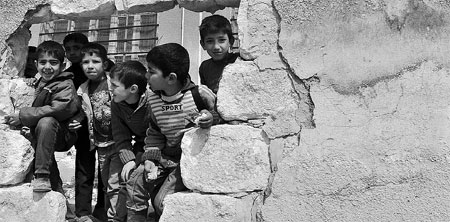US evaluating Syria chemical weapons charges
|
Syrian children look out from a hole in a wall during a funeral ceremony of a Syrian army soldier who was killed as he tried to defect, in Azmarin village, in the northwestern province of Idlib, on Tuesday. The conflict has killed at least 70,000 people, and forced more than one million Syrians to seek refuge abroad. Bulent Kilic / Agence France-Presse |

The United States said on Tuesday it was evaluating allegations of chemical weapons use in Syria, but dismissed charges that the opposition had used such weapons in the two-year-old conflict.
The Syrian government and rebels accused each other of launching a deadly chemical attack near the northern city of Aleppo on Tuesday in what would, if confirmed, be the first use of such weapons in the conflict.
The state-run SANA news agency said "a missile containing a chemical substance" was fired at the village of Khan al-Assal by "terrorists". Deputy Foreign Minister Faysal Mekdad said 31 people were killed, calling it "another crime to be added to the record of armed terrorist groups that are supported by some Arab countries and Western countries".
The rebels quickly denied using chemical weapons and accused government forces of doing so.
China firmly opposes any breach of international law by the use of chemical weapons, Foreign Ministry Spokesman Hong Lei said on Tuesday at a daily news conference.
White House Spokesman Jay Carney said they have no evidence to substantiate the charge that the opposition has used chemical weapons.
"We are looking carefully at allegations of ... chemical weapons use, we are evaluating them," he said.
An international anti-chemical weapons body said on Tuesday that it had no independent information about any use of such arms in Syria, but it was "closely monitoring" the situation.
Ahmet Uzumcu, director general of the Organization for the Prohibition of Chemical Weapons, said it would look at media reports about what had happened and "try to identify the symptoms which may be detected" in order to make an assessment.
Asked whether the organization had independent information verifying the use of chemical arms, Uzumcu said: "No, we don't. I don't think we know more than you do at the moment. Of course we have seen those reports, and we are closely monitoring the situation."
But Yuval Steinitz, newly appointed Israeli minister of intelligence and strategic affairs, said on Wednesday that it is "apparently clear" that chemical weapons were recently used in Syria, either by the rebels or by the government.
Steinitz, who was speaking to Army Radio, did not say how he came to the conclusion that the weapons were used.
Two leading US lawmakers, while cautioning that reports of chemical weapons use by the Syrian government had not been confirmed, expressed concern after being briefed on the situation by Obama administration officials.
"It is serious, and it may well take some action," Democratic Senator Dianne Feinstein, who chairs the Senate Intelligence Committee, said after the closed-door afternoon briefing. She spoke in an interview with CNN.
"I think the White House needs to complete an assessment and make some statement as to what action the US will take," she said, according to a preliminary transcript of the broadcast obtained by Reuters.
Republican Representative Mike Rogers, who chairs the House Intelligence Committee, told CNN: "Do I believe that they have configured weapons and may have used them? Yes. However, we don't know for sure, and for certain. I think that will happen within hours, if not days."
The Pentagon said it was also monitoring the situation.
"I have no information at this time to corroborate any claims that chemical weapons have been used in Syria," Pentagon Spokesman George Little said. "The use of chemical weapons in Syria would be deplorable."
Carney reiterated that President Barack Obama has said there would be consequences and the government of President Bashar al-Assad would be held accountable if chemical weapons were used. Carney would not say what those consequences would entail.
One of the international community's biggest concerns is that Syria's arsenal of chemical weapons could be used by one side or the other, or could fall into the hands of foreign militants.
Carney said this "is a serious concern", adding that the US position was still that it was supplying only non-lethal aid to the Syrian opposition.
"Our position is and remains that we are not supplying lethal assistance to the opposition," he said.
Reuters-AP
(China Daily 03/21/2013 page11)















